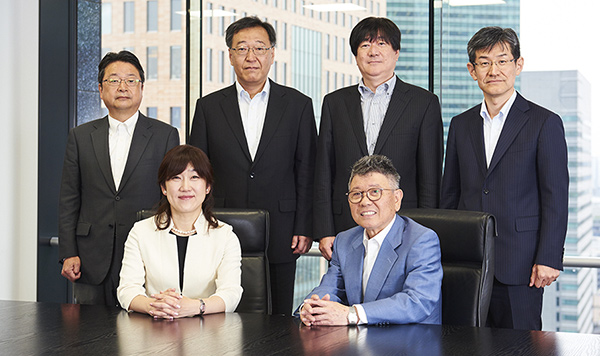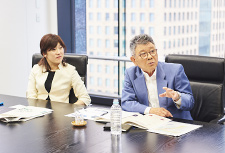

In the interest of integrating its management and CSR, JSR Group identifies priority issues and presents them in its CSR report to help realize a sustainable global environment and society.
In this connection, we recently invited experts on "work-style reform" to JSR to discuss two topics concerning JSR Group's approach to reform.
The first topic concerned "work styles and human resources development of the future, with general focus on the years 2025 and 2030." Here, we used "the digital revolution" and "sustainability" as vantage points to examine the abilities and skills that will be demanded in a society increasingly permeated by AI and IoT, and additionally to delve into the question of how company employees and management should change—and conversely how they must not change—in response to the changing times.
And the other topic concerned "work style-related challenges confronting JSR Group." Here the discussion examined such important challenges as curtailing work hours, work-life balance, diversity, health management, and safety management.
We plan to incorporate priority issues that were newly identified through the discussion as well as our guests' advice and opinions into forthcoming activity plans.
Work styles of the future
- Nejigaki:
- JSR Group has commenced a new mid-term business plan that began in FY2017 and extends to FY2019. "Work-style reform" is positioned as a pillar of the plan's advancement. Seeing "employees as the leaders of action," we will tackle reform by sharing objectives, changing awareness and customs, and acting as a whole. To begin, our Human Resource Development Department is stepping forward to establish rules for eliminating wasteful activities and inconsistencies in internal meetings and e-mails. It is also implementing a "work-style reexamination project" to which it has invited external consultants.
In addition, we recently hosted a dialogue between JSR's president and an outside expert as part of planning for our FY2017 CSR report. They discussed the new mid-term business plan, the company's long-term vision for the future, and the kinds of employees and work styles best suited for JSR Group. During the dialogue, the president presented his own thinking concerning work-style reform and the areas he views as problematic. Our president says, "Work-style reform is not just about dealing with overtime work. The important question is how to improve labor productivity by adding technology." He also outlined his concerns that the company's organization lacks the desire to take on new challenges, and that more opportunities must be created for employees to encounter new technologies. Additionally, he explained that we made our new mid-term business plan effective up to FY2019, rather than FY2020, so as to incorporate into it the idea that it is the coming generation who must consider JSR Group's direction in 2020 and beyond.
In light of this, I would like to start our discussion today by looking at the work styles of the future, with general focus on the years 2025 and 2030.
Thinking about the future, with the world and JSR Group of the present as starting points
- Nakamura:
- I think three impacting factors will decide the work styles of the future. The first is change in the industrial structure. Manufacturing's share of GDP is decreasing, while the service industry's share continues to grow. The second is demographics. As the birthrate declines and the population ages, the population pyramid will steadily transform into an inverted triangle. And the third is technological advancement. This refers to the steady permeation of certain elements—AI, robotics, and the "sharing economy"—into workplaces and daily life. We must explore future work styles in a manner that considers these elements.
- Sasaki:
- While there can be no doubt that work styles will change in the future, we still don't know how they will change. Some people say jobs will be lost to AI and robots, but others say they won't. And many jobs will probably completely disappear from mechanization, as we saw with the ticket gates at train stations. However, it could also be surmised that, as the working population shrinks due to the low birthrate, everyone—women, the elderly, people with disabilities, and foreigners—will need to work and therefore jobs will not be lost. So even if we can picture specific aspects, that doesn't mean we can go so far as to predict how society as a whole will change.
- Fujii:
- First of all, looking at things as a manufacturer, I think that some operations at manufacturing sites will be replaced by AI and robots. But I must admit that I have no idea how far white-collar jobs in, say, R&D, sales, or back office operations will be affected.
- Doi:
- It is said that jobs in legal affairs will be replaced by AI, but I don't think all will be lost. I think AI will save labor, but ultimately work requiring human decisions will still remain. At any rate, I think we must acquire the ability to fully utilize technology in preparation for the future.
- Kawahashi:
- In R&D, improving "quality" and "quantity" are important in boosting the competitiveness of product development. I think it will be necessary to change work styles so that certain facets of "quantity" (which involves movement of hands and feet) are replaced by robotics and certain facets of "quality" (which involves use of brain power) are replaced by AI, leaving human beings with the task of creating ideas that spark innovation. The important thing will be to do this as soon as possible. If we don't, we will lose to our competitors.
- Sasaki:
 When it comes to the introduction of AI and robotics, I think there is an aspect that will depend on the supply-and-demand balance. For example, if there are fewer taxi drivers, self-driving vehicles will probably become more common. At construction sites, surveying and other work are changing completely with the use of drones. And I think that if there are shortages of nursing-care staffers, nursing-care robots will be substituted for them. The point is that demand will spur development.
When it comes to the introduction of AI and robotics, I think there is an aspect that will depend on the supply-and-demand balance. For example, if there are fewer taxi drivers, self-driving vehicles will probably become more common. At construction sites, surveying and other work are changing completely with the use of drones. And I think that if there are shortages of nursing-care staffers, nursing-care robots will be substituted for them. The point is that demand will spur development.
Companies must decide what to value on their own, and then create steps on their own.
- Nakamura:
- Everyone has mentioned that we can't fully predict the future, but I think there is no real need to predict it. This is because what JSR Group will do is more important than what will happen in society. In an age when predicting the future is impossible, what we must do is decide on our own what our next step will be and then create the next stage.
- Fujii:
- There is one thing that troubles me in the area of human resource development. In her book titled Work Shift, Lynda Gratton writes that only single-field professionals will be required in the future, and generalists will become unnecessary. I wonder if that's really true. JSR stresses generalist ability and handles its personnel on a rotational basis. Because we live in an age of rapid change, I think even single-field professionals like those we see in Europe and the United States will lose their jobs. I get the sense that it will actually be the generalists who will be able to survive.
- Nakamura:
- A report by Recruit Works Institute called "Work Model 2030" that was published in November 2016 states that Japan (a country in which 90% of people are employed) must expand its freelancer and entrepreneur categories. It also says that generalist human resources should become "producers." I should add that the "single-field professional" mentioned by Lynda Gratton can be defined as a "technologist." A technologist is an advanced professional possessing a narrow and through expertise in a specific area. He or she is a person who increases the added value of his or her work by producing and utilizing technology. In other words, he or she aims to produce competitiveness. More specifically, a technologist is a person capable of developing his or her own field of specialization. A "producer" is a person who produces new value and business models by bundling such technologists together. He or she functions to stimulate the economy by seeking venues for activity, whether they be global or local, to give shape to his or her ideas. The conventional view of a generalist is of a "person who is adept at in-house adjustment." I think there is a clear distinction here.
What approaches should be taken in designing human resources and applying them to products and business?
- Kawahashi:
- I agree with the argument that producers and technologists are necessary. I see this as the importance of having "design skills" for applying society's needs to materials, products, and business, and for developing and appropriately assigning the human recourses necessary for those tasks.
- Nakamura:
- I see. The word "designer" expresses role and function nicely, doesn't it. I should add that producers and technologists have something in common,which is that they "know that there are things they don't know." That's why their abilities to learn and absorb are extraordinary and boundless. The most important skill for both producers and technologists is the ability to change themselves as impactful events occur, as I previously mentioned. Technologists must possess more advanced expertise to be able to change themselves quickly. Producers must expand the network of new technologists with the concept of open innovation. Master what it takes to be a technologist and you become a producer. The important point is to translate that effort into competitiveness.
- Doi:
- I think an important question is how to cultivate producers and technologists as JSR Group. But before that, we must establish a clear picture of the producers and technologists that JSR Group needs.

To Discussion (2) "The Challenges Facing JSR Group"


 When it comes to the introduction of AI and robotics, I think there is an aspect that will depend on the supply-and-demand balance. For example, if there are fewer taxi drivers, self-driving vehicles will probably become more common. At construction sites, surveying and other work are changing completely with the use of drones. And I think that if there are shortages of nursing-care staffers, nursing-care robots will be substituted for them. The point is that demand will spur development.
When it comes to the introduction of AI and robotics, I think there is an aspect that will depend on the supply-and-demand balance. For example, if there are fewer taxi drivers, self-driving vehicles will probably become more common. At construction sites, surveying and other work are changing completely with the use of drones. And I think that if there are shortages of nursing-care staffers, nursing-care robots will be substituted for them. The point is that demand will spur development.